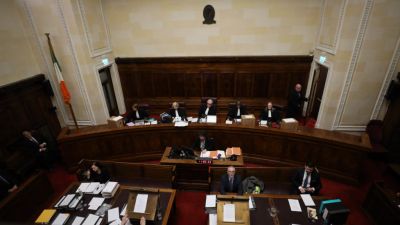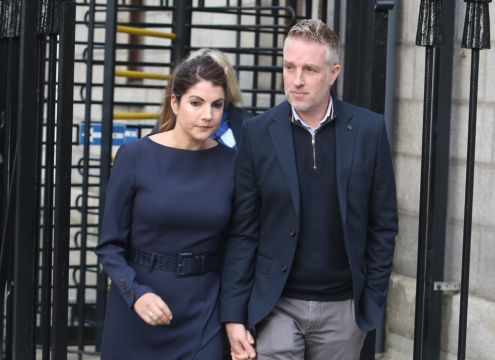A High Court judge has said he is not convinced legislators appreciate the “true need for expedition” when dealing with the introduction of a law to regularise and recognise international surrogacy.
Mr Justice John Jordan said legislation to address legal lacunas arising from surrogacy arrangements was “flagged as necessary” by the Supreme Court as long ago as 2009, and again in 2014 that court said Irish legislation had failed to address deficits.
The judge made the comments at the High Court on Tuesday, when an action brought by Kathy and Brian Egan, of Castlecomer Road, Kilkenny, returned for the State’s lawyers to clarify its position regarding the Government’s proposal to introduce legislation in this area.
Surrogate mother in Ukraine
One of the couple’s children was born in 2019 to a surrogate mother in Ukraine, as part of a commercial arrangement.
Their case asks the court to declare that the State has failed to vindicate their constitutional rights by failing to recognise Ms Egan as the boy’s legal mother.
Mr Egan is the child’s genetic and legal father, while Ms Egan is his genetic mother and legal guardian, a relationship that will cease, legally, when he turns 18.
Last month, on the fifth day of hearing the case, Mr Justice Jordan expressed dissatisfaction that the court learned through the media of plans to recognise and regulate international commercial surrogacy.
He said the proposed bill was relevant to the core issue in the Egans’ case, which challenges Ireland’s lack of recognition of international surrogacy arrangements.
No update
On Tuesday the judge said he asked the State for its position on Monday, and there was no update available. This resulted in a letter from the Chief State Solicitor’s office being furnished to the Egans’ lawyers, he said.
Referencing the letter, the Egans’ barrister, Nuala Jackson, instructed by solicitor Annette Hickey, said the couple was “a little concerned and a little disappointed that the information being given to the applicants in these proceedings would, indeed, appear to be less than that which is pretty widely available”.
Ms Jackson said the letter appeared to give her clients and the court “somewhat reduced information” than what is in the public domain and what has been told to advocacy groups.
She wanted the State to give an undertaking to the court to communicate any government decision to the Egans, as she said was undertaken in the letter. She asked for the first available court date next year.
Senior Counsel Mary O’Toole, for Ireland and the Attorney General, said she couldn’t possibly object to the request for a date early next term.
Mr Justice Jordan listed the matter for next Wednesday, at which point he will expect the matter “will have been considered by the Government and I expect the court to be advised in advance without having to ask” what progress has been made.

Responding, Ms O’Toole said the State parties will “obviously” advise the court as soon as a decision has been made, but many of the matters discussed are subject to Cabinet confidentiality.
The court could not “effectively direct” the executive, she said, adding that there “may or may not be information to circulate” by next week.
The judge said he was not directing the executive to do anything. He was following the wording of the undertaking given in the letter, he said.
He adjourned the case until next week.







